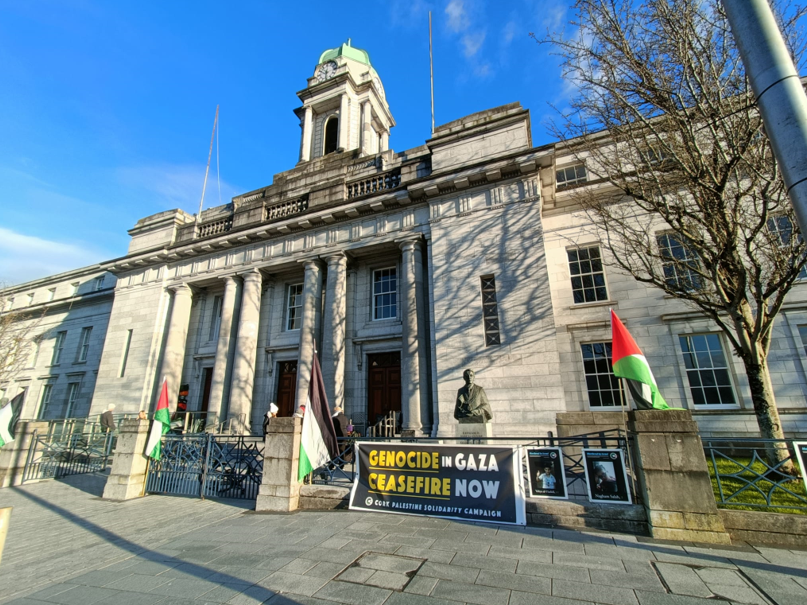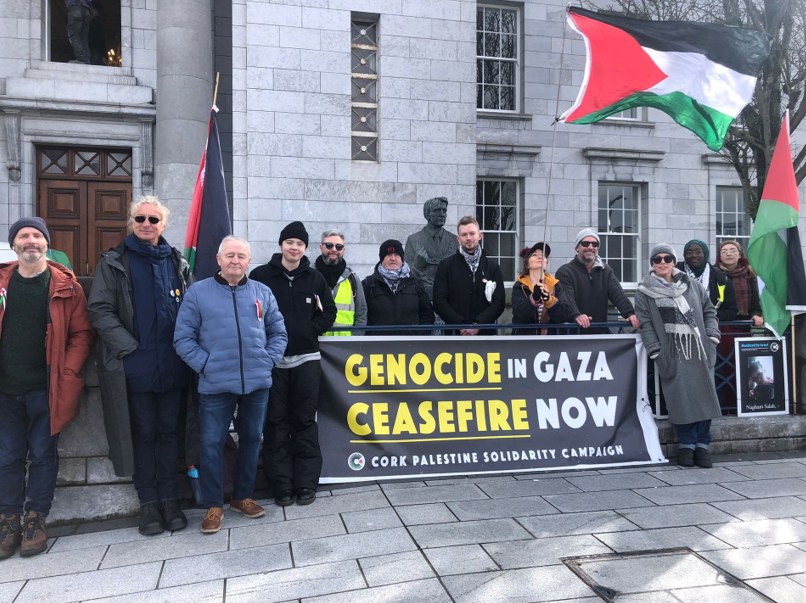Cork Palestine Solidarity Campaign’s Fast for Palestine: ‘I know where my next meal is coming from.’
By Deputy News Editor Marc Galdes
The camp outside City Hall.
As part of Anti-Apartheid Week 2024, the Cork Palestine Solidarity Campaign (CPSC) organised a 72-hour fast whilst camping on the steps of City Hall to be in solidarity with the Palestinian people.
‘That sinking feeling in your stomach is there, and it's not from hunger, it's from the pain of what's happening right now,’ Eve O Riordan, who was sitting in for the full 72-hour fast, told the University Express.
The fast began at 9 am on Monday, 25 March. There were around 20 people taking part in the fast, however, not all of them were sitting for the full 72-hour fast, and some limited their fast to 24 or 48 hours. For the full 72-hour fast three people chose to do this: Eve, Juri and Brian. Besides those fasting, we were informed that around 100 people between the first and second day had gone down to express their support.
‘People are contributing in the way that they can,’ Catherine O’Sullivan, who had finished her 24-hour fast, explained as she said that some volunteers did not let their work commitments get in the way of their fast, so they chose to fast whilst working from home.
This was not the first fast Cork Palestine Solidarity Campaign (CPSC) organised. Back in October, they held their first 24-hour fast which was not a sleepout. Then, on St Stephens Day they also held one for 24 hours, this time sleeping outside City Hall.
Many different groups and organisations also took part in the anti-apartheid week. The fast was not only the event organised this week: pickets were held in front of McDonald's, Lidl and AXA; marches, fundraisers, and talks were held throughout the week.
After the first gruelling stormy night of camping and fasting outside City Hall, on Tuesday 26 March, the University Express decided to visit City Hall to speak to some of the volunteers and see how they are holding up.
Photo of volunteers outside City Hall. Credit: CPSC’s Facebook page
Both Catherine and Eve were very welcoming and happy to speak to us. Although experiencing a sleepless stormy night and not having eaten for around 32 hours, Eve seemed to be in high spirits.
‘The moral is really good. The amount of support that has been flowing down, it’s been amazing. People are calling to make sure that we’re warm. Bringing water to drink. Just general support. We had a lot of the business owners, yesterday especially, coming out wishing us well. So the support within the City itself, and obviously within the campaign, has been fantastic,’ Eve said.
Besides the support they were receiving, the massacre of Palestinian people has been at the back of their minds.
‘Yes, sleeping out in the rain at 4 am as you hear the rain hitting off the tarpaulin is difficult... but I don't have a drone over my head. There’s nobody dropping bombs on me. I know where my next meal is coming from. Trying to counter-balance that reality with the reality of what's happening with the people of Palestine right now, is devastating.’
Asked about why they have chosen to do a 72-hour fast, Eve said that as Irish people they can ‘understand their pain’.
‘From our history, we have a real clear understanding of how the people of Palestine are feeling right now. Because it's still so young in our own history, we can't forget that we need to be in solidarity with the people of Palestine and not forget. It's very easy for us to all go about our days, to sit out and fast and to be hungry is to be with them, to be in solidarity.’
On Monday 25 March, hours after the fast began, The UN Security Council passed a resolution calling for an immediate cease-fire between Israel and the Palestinian group Hamas and the release of all hostages, as the US abstained and chose not to exercise its veto power. The ceasefire is supposed to last two weeks, until the end of Ramadan on 9 April.
Hours after this resolution was passed, hopes for a ceasefire faded and there were reports that Israel continued to drop bombs on the City of Rafah.
Catherine expressed how the group had ‘mixed feelings’ about this resolution.
‘While it is good that the US has finally stopped vetoing the resolutions for a ceasefire, it’s only a temporary ceasefire for two weeks, until the end of Ramadan. And Israel has already said that they're not going to heed at all and they're going to plough on regardless... They've already invaded Rafah and they're not listening to the resolution.’
Catherine noted that possibly a UN resolution could create more pressure, but she expressed her frustration that it was not being respected. ‘You want a UN resolution to be upheld and for international law to mean something. Hopefully, it will create more pressure on other international leaders to hold Israel to account because they're so blatantly disregarding any international humanitarian law.’
Photo of Mural in Belfast showing solidarity with the Palestinian people. Credit: Reuters
As Leo Varadkar resigns from his post as Ireland’s Taoiseach, the former Minister for Higher Education Simon Harris has stepped up to take his place.
Shortly after we spoke to CPSC, Foreign Minister Micheál Martin announced that Ireland is preparing to join South Africa’s genocide case against Israel at the International Court of Justice (ICJ) under the 1948 Genocide Convention, which was confirmed a day later. The Irish government had already expressed its interest back in January. As of yet, no details have been given as to how Ireland will be involved in supporting South Africa.
Asked what they expect from the new Taoiseach, Catherine said: ‘We would love to see more concrete action, such as putting in place the occupied territories bill and using the relationship that the Irish government has with the US and be a strong player in that, in the negotiations.’
The Control of Economic Activities Bill 2018 (occupied territories bill) would ban all trade with ‘illegal settlements in occupied territories’ – does not specifically mention Israel and Palestine, but it would apply to this case. The bill has been stuck at the second stage in the Dáil as last year, the government blocked the bill over concerns that it clashes with European law.
However, overall neither had very strong opinions on what Harris might do differently to his predecessor, they simply said that they would give the new Taoiseach a bit more time.




